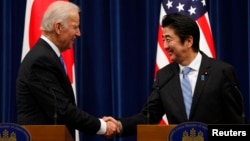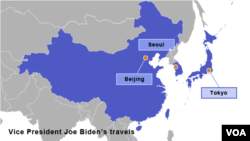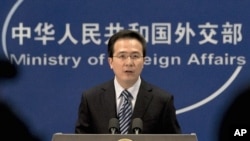SEOUL —
U.S. Vice President Joe Biden and Japan's Prime Minister Shinzo Abe say China's declared air defense zone in the East China Sea is intolerable and raises the risk of miscalculation leading to conflict. Beijing's unilateral move upset its neighbors as the zone overlaps disputed territory.
Biden on Tuesday met with Japanese officials, including Abe, at the start of a week-long visit to Asia.
The long-scheduled trip to the region was supposed to center on an increased U.S. focus on Asia and efforts to negotiate a trans-Pacific trade agreement. But, Beijing's declaration of an Air Defense Identification Zone (ADIZ) in November set off alarm bells in Washington, Tokyo, and Seoul.
China says any aircraft wanting to fly through the expanded zone in the East China Sea must first submit a flight plan to Beijing. China also reserves the right to deny entry to the airspace. But the zone overlaps international waters and territory administered by Japan and South Korea.
At a joint news conference after their meeting, Biden said the U.S. was deeply concerned about a move to change status quo in the East China Sea.
“This action has raised regional tensions and increased the risk of accidents and miscalculation,” the vice president said.
Biden said the risk of escalation is too high and underscores the need for crisis management mechanisms and effective channels of communication between China and Japan.
Abe echoed those concerns, saying they agreed China's actions should not be tolerated. He said they reaffirmed that policies and measures, including the operations of Japan's self defense and police forces would not change. Abe said Japan would work closely with the U.S. on the issue and agreed they would not condone any action that would threaten the safety of civilian aircraft.
Some Japanese media expressed alarm when Washington said U.S. commercial aircraft, for safety reasons, should abide by China's new rule.
Tokyo instructed its commercial carriers to ignore Beijing's declaration.
Seoul plans to respond to China's overlapping defense zone by expanding its own zone.
China threatened unspecified defense measures for any aircraft that ignore the new rule while saying it would stop short of shooting down civilian airplanes.
Foreign Ministry spokesman Hong Lei said Biden's remarks were based on the vice president's understanding of the air defense zone.
He said China has suggested strengthening dialogue with Japan to properly resolve the issue of flight safety, but the Japanese side keeps saying they should hold dialogue while closing the door to talks.
Seoul, Tokyo, and Washington all flew military aircraft in the zone last week without informing Beijing.
The defense zone overlaps disputed islands called Senkaku in Japan and Diaoyu in China. Tokyo has administrative control over the small but strategically important islands, but Beijing frequently asserts its claim to the territory with coast guard and jet fighter patrols.
China's declared zone also overlaps a South Korean research station built on top of a submerged rock formation.
Biden said he will raise the issue with China's President Xi Jinping after he arrives Wednesday in Beijing.
The vice president on Thursday travels to South Korea to discuss security concerns raised by China and North Korea.
China's aggressive moves to assert its claims to disputed territory periodically raise tensions in Asia.
China's ambassador to the Philippines on Monday said Beijing has the right to declare a similar aviation defense zone over the South China Sea. China claims most of the South China Sea putting it in conflict with claims by Brunei, Malaysia, the Philippines, Taiwan and Vietnam.
Biden on Tuesday met with Japanese officials, including Abe, at the start of a week-long visit to Asia.
The long-scheduled trip to the region was supposed to center on an increased U.S. focus on Asia and efforts to negotiate a trans-Pacific trade agreement. But, Beijing's declaration of an Air Defense Identification Zone (ADIZ) in November set off alarm bells in Washington, Tokyo, and Seoul.
China says any aircraft wanting to fly through the expanded zone in the East China Sea must first submit a flight plan to Beijing. China also reserves the right to deny entry to the airspace. But the zone overlaps international waters and territory administered by Japan and South Korea.
At a joint news conference after their meeting, Biden said the U.S. was deeply concerned about a move to change status quo in the East China Sea.
“This action has raised regional tensions and increased the risk of accidents and miscalculation,” the vice president said.
Biden said the risk of escalation is too high and underscores the need for crisis management mechanisms and effective channels of communication between China and Japan.
Abe echoed those concerns, saying they agreed China's actions should not be tolerated. He said they reaffirmed that policies and measures, including the operations of Japan's self defense and police forces would not change. Abe said Japan would work closely with the U.S. on the issue and agreed they would not condone any action that would threaten the safety of civilian aircraft.
Some Japanese media expressed alarm when Washington said U.S. commercial aircraft, for safety reasons, should abide by China's new rule.
Tokyo instructed its commercial carriers to ignore Beijing's declaration.
Seoul plans to respond to China's overlapping defense zone by expanding its own zone.
China threatened unspecified defense measures for any aircraft that ignore the new rule while saying it would stop short of shooting down civilian airplanes.
Foreign Ministry spokesman Hong Lei said Biden's remarks were based on the vice president's understanding of the air defense zone.
He said China has suggested strengthening dialogue with Japan to properly resolve the issue of flight safety, but the Japanese side keeps saying they should hold dialogue while closing the door to talks.
Seoul, Tokyo, and Washington all flew military aircraft in the zone last week without informing Beijing.
The defense zone overlaps disputed islands called Senkaku in Japan and Diaoyu in China. Tokyo has administrative control over the small but strategically important islands, but Beijing frequently asserts its claim to the territory with coast guard and jet fighter patrols.
China's declared zone also overlaps a South Korean research station built on top of a submerged rock formation.
Biden said he will raise the issue with China's President Xi Jinping after he arrives Wednesday in Beijing.
The vice president on Thursday travels to South Korea to discuss security concerns raised by China and North Korea.
China's aggressive moves to assert its claims to disputed territory periodically raise tensions in Asia.
China's ambassador to the Philippines on Monday said Beijing has the right to declare a similar aviation defense zone over the South China Sea. China claims most of the South China Sea putting it in conflict with claims by Brunei, Malaysia, the Philippines, Taiwan and Vietnam.



